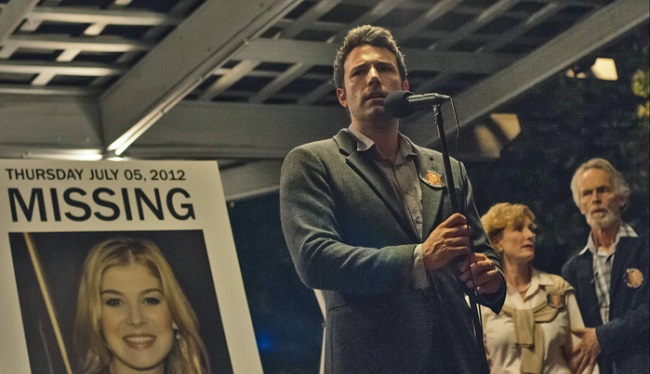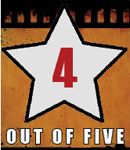

Three years ago, director David Fincher took a sleazy best-seller called The Girl With the Dragon Tattoo, did some Fincher-y things to it as he adapted it for the screen, and ended up with a pretty entertaining film that was never going to be mistaken for one of his best movies but made for a compelling watch nonetheless. Cut to present day, when he's taken a sleazy best-seller called Gone Girl, done some Fincher-y things to it, and ended up with …. well, pretty much the exact same thing. If this happens too many more times, it may start to get disappointing. But twice isn't a sin, and, just like with Dragon Tattoo, Gone Girl will serve as a solid, though certainly not defining entry in the director's filmography.
At the least, the film gives Fincher all the material he needs to riff on some juicy themes: the lies couples are forced to tell each other, as well as themselves, after they settle into marriage; the notion of identity, and whether it's something that is controlled by the individual, by the community or by, god forbid, the media; and how easily a person's life can be derailed by a recession, a sick parent or any number of circumstances beyond their control. Even better, Gone Girl finally gives Fincher, who has churned out all types of thrillers, an excuse to go full Hitchcock. I'm not sure who's going to have the balls to protest that development, but it's certainly not going to be me.
Gone Girl opens with a mystery. Somewhere in Missouri, a husband, Nick Dunne (Ben Affleck), comes home to find a glass table shattered and his wife, Amy (Rosamund Pike), missing. The cops are called, and, before long, murder is suspected. Nick is cooperative, but the police, led by Det. Rhonda Boney (Kim Dickens), are quick to mark him as the primary suspect. The media seems ready to hang him from the word "go," and the case draws national attention as Amy was the inspiration for a series of best-selling children's books that her mother wrote. During the first half of the movie, we follow the police investigation, as well as Nick's attempts to navigate the impossible situation he's been put into, while at the same time flashing back to Nick and Amy's life together — their meet-cute, their first date, the evening he proposed — courtesy of Amy's diary entries, a device that allows Pike to remain at the forefront of the film. From the audience's perspective, the mystery is less about whether or not Nick was involved in her disappearance (a question I think is answered early on thanks to the staging of a particular scene) and more about just what happened to her in the first place?
And then, halfway through, you find out.
And then, in the spirit of Psycho, things get really fucking crazy.
To elaborate more on the plot would be unfair to those who have neither read the book nor yet seen the movie, but, suffice to say, more than one character has a discomforting secret that isn't revealed to the audience until Fincher and screenwriter Gillian Flynn (who also wrote the book) are good and ready to do so. And once the twists are out of the way, Fincher unleashes a tidal wive of psychological torment on his characters. He also pulls out one scene of spectacular ultraviolence just for good measure. The movie lives or dies by the events that play out after we understand what happened to Amy, and, to Fincher's credit, I continued to be interested in everyone's fates even once the film's mystery component was no longer in play.
Gone Girl is exceptionally well cast. Nobody should be walking out of this movie saying, "Aha! Affleck is a master thespian after all! He should give up directing and refocus his energies on acting at once!" His isn't a performance that makes us question all that we thought we knew. But having him play a smooth-talking, slightly assholish ex-frat boy type who's thrown into the spotlight after making some questionable decisions as an adult is an inspired filmmaking decision. Even his famous chin is put to good and specific dramatic use! And though I've yet to become a big Pike fan — and wonder if a different actress could have done more with this part — there's no doubt she does well enough to create what is her most memorable role to date. Interestingly, my favorite turn in the movie might be from Dickens, who is given a far less flashy part than the two leads but turns the boring cop role into a compelling and authentic character. (She also gets a nifty little back-and-forth going with Almost Famous' Patrick Fugit, playing a subordinate officer.) Heck, even Tyler Perry shows up as a hotshot lawyer whom Nick hires, and he's great fun to watch during the short time he's on screen.
The film goes to some very dark places, but Fincher stylizes it enough — and its source material is trashy enough — that it proves enjoyable rather than difficult to watch. The movie looks gorgeous … of course. The score by Trent Reznor and Atticus Ross is moody and distinctive … of course. And after a summer that was dominated by the usual comic-book and toy-store fare, I suspect audiences might flock to Gone Girl's brand of wholly-adult-but-not-terribly-challenging entertainment. And if we must differentiate it from Fincher's last film, I'd say that, despite the huge narrative twists, Gone Girl is ultimately more focused that the sprawling Dragon Tattoo. That doesn't necessarily mean it's the more accomplished work, but it might make it the more memorable and easier-to-appreciate movie.











